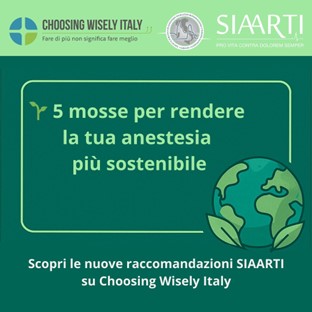
Operating rooms are among the areas of the hospital with the highest environmental impact and Anesthesiologists and Intensive Care physicians with their daily choices can make a decisive contribution to the adoption of more sustainable practices: anaesthetic gases are powerful greenhouse gases and alone contribute to approximately 5% of climate-altering gas emissions from health services.
As part of the Green Choosing Wisely Italy initiative, the Italian Society of Anesthesia, Analgesia, Resuscitation and Intensive Care (SIAARTI) has therefore defined 5 recommendations on Green Anesthesia.
The first recommendation is to not use inhaled anaesthetics with a high global warming potential such as desflurane and nitrous oxide and to replace them with others that are equally effective and less harmful to the environment, or with alternative anaesthetic techniques such as totally intravenous general anesthesia or locoregional anesthesia. Desflurane has a GWP (Global Warming Potential) index that is over 2,500 times that of CO2; the dose needed to keep a patient asleep for an hour is equivalent to a car traveling 320 km.
Subsequent recommendations concern the use of more sustainable anesthesiological techniques, materials and behaviors in the operating room.
Waste management is fundamental, given that operating rooms generate at least 25% of total hospital waste and approximately 25% of this is attributable to anesthesiological practices.
According to the “reduce-reuse-recycle” strategy, it is recommended to reduce the use of disposable materials as much as possible, favoring for example reusable surgical gowns and drapes and reconditionable devices, and to arrange for separate waste collection.
As a final recommendation, the fundamental role of the anesthetist-resuscitator as a protagonist and promoter of sustainable practices in the operating room and in intensive care alongside surgeons and healthcare workers is underlined, with the training support of professional societies.
Alongside SIAARTI in Italy, the World Federation of Societies of Anaesthesiologists in 2022 and the European Society of Anaesthesiology and Intensive Care in 2024 have also addressed the issue of sustainability in anesthesia.
As with the other recommendations, their dissemination and implementation is now essential, together with continuous monitoring of their impact.


Recent Comments